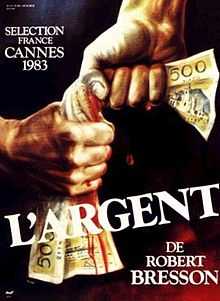L'Argent (1983 film)
| L'Argent | |
|---|---|
 Theatrical release poster | |
| Directed by | Robert Bresson |
| Produced by |
Jean-Marc Henchoz Daniel Toscan du Plantier |
| Written by | Robert Bresson |
| Based on |
The Forged Coupon by Leo Tolstoy |
| Starring |
Christian Patey Béatrice Tabourin Didier Baussy Vincent Visterucci |
| Cinematography |
Pasqualino De Santis Emmanuel Machuel |
| Edited by | Jean-François Naudon |
| Distributed by | MK2 Diffusion |
Release dates |
|
Running time | 83 minutes |
| Country |
France Switzerland |
| Language | French |
L'Argent (French pronunciation: [laʁ.ʒɑ̃], meaning "Money") is a 1983 French drama film directed by Robert Bresson. It is loosely inspired by the first part of Leo Tolstoy's novella The Forged Coupon. It was Bresson's last film. It earned its maker the Director's Prize at the 1983 Cannes Film Festival.
Plot
A young man enters his father's study to claim a monthly allowance. His father obliges, but the son presses for more, citing a debt at school he must pay. The father dismisses him and an appeal to his mother fails. This leads him to pawn off his watch to a friend who, instead of paying him, provides him with a forged 500-franc note. After the trade, the youth lingers to peruse an album of nude art, with similar images to appear throughout the film.
The boys take the counterfeit to a photo shop and change it on the pretext of buying a picture frame. When the store co-manager finds out, he scolds his partner for her lack of wariness. She chides him in return for having accepted two forged notes the previous week. He then vows to pass off all the forged notes in their possession at the next opportunity, which arises when a gas man, Yvon, comes in with a bill.
Yvon tries to pay a restaurant tab with the forged notes, but the waiter recognizes them as counterfeit. Yvon is arrested, but avoids jail time; however, he loses his job. Needing money, he acts as the get-away car driver for a friend's bank robbery. The robbery is foiled by police, and Yvon is arrested. He is sentenced to prison for three years. While in prison, his daughter dies and his wife writes to him that she is leaving him to start a new life.
When released from prison, Yvon has nothing. Right away, he murders hotel keepers and robs their till. He then hides out in the house of a kind woman and her family. Some time passes, and one night Yvon kills everyone in the house with an axe. He goes to a restaurant, confesses to a police officer, and is arrested.
Cast
- Christian Patey as Yvon Targe
- Vincent Risterucci as Lucien
- Caroline Lang as Elise
- Sylvie Van den Elsen as Grey Haired Woman
- Michel Briguet as Grey Haired Woman's Father
- Béatrice Tabourin as La photographe
- Didier Baussy as Le photographe
- Marc Ernest Fourneau as Norbert
- Bruno Lapeyre as Martial
Production
Bresson first began work on the film's script in 1977. It is based on Leo Tolstoy's The Forged Coupon. Bresson later said that it was the film "with which I am most satisfied- or at least it is the one where I found the most surprises when it was complete- things I had not expected."[1]
Reception
The film was released in France on 18 May 1983 through MK2 Diffusion.[2]
Critical response
Vincent Canby wrote in The New York Times: "That Robert Bresson, the veteran French director, is still one of the most rigorous and talented film makers of the world is evident with the appearance of his beautiful, astringent new film, L'Argent". Canby wrote: "Like all Bresson films, L'Argent can't be interpreted exclusively in social, political or psychological terms. ... L'Argent would stand up to Marxist analysis, yet it's anything but Marxist in outlook. It's far too poetic - too interested in the mysteries of the spirit."[3]
Tom Milne said that "there is something more intangible here, something which leads to the extraordinary apotheosis of the final sequence, which Bresson has casually described as a routing of the forces of evil. A startling interpretation, on the face of it, for brutal murder and abrupt confession, yet one confirmed rather than denied by the sense of tranquil finality in the image of Yvon watching as the ripples close over his bloody axe in the pond, and of breathless wonderment in the last shot of onlookers frozen as they gaze into the empty room from which all evidence of crime has gone...Even bleaker than Le Diable, probablement, L'Argent is even more unmistakably a masterpiece. And even here, finally, "All is Grace'."[4]
Accolades
Bresson received the Director's Prize at the 1983 Cannes Film Festival, tied with Andrei Tarkovsky for Nostalghia.[5] L'Argent was nominated for Best Sound at the César Awards 1984.[6] It won the 1984 National Society of Film Critics Award for Best Director.[7]
References
- ↑ Wakeman, John. World Film Directors, Volume 1. The H. W. Wilson Company. 1987. ISBN 0-8242-0757-2. pp. 62.
- ↑ "L'Argent". AlloCiné (in French). Tiger Global. Retrieved 2011-10-14.
- ↑ Canby, Vincent (1983-09-24). "'L'Argent', 13th feature by Bresson". The New York Times. Retrieved 2011-10-14.
- ↑ Wakeman. pp. 62.
- ↑ "Festival de Cannes: Awards 1983". festival-cannes.com. Cannes Film Festival. Retrieved 2011-10-14.
- ↑ "L'Argent - Prix et nominations". AlloCiné (in French). Tiger Global. Retrieved 2011-10-14.
- ↑ "Past Awards". nationalsocietyoffilmcritics.com. National Society of Film Critics. Retrieved 2011-10-14.
External links
| ||||||